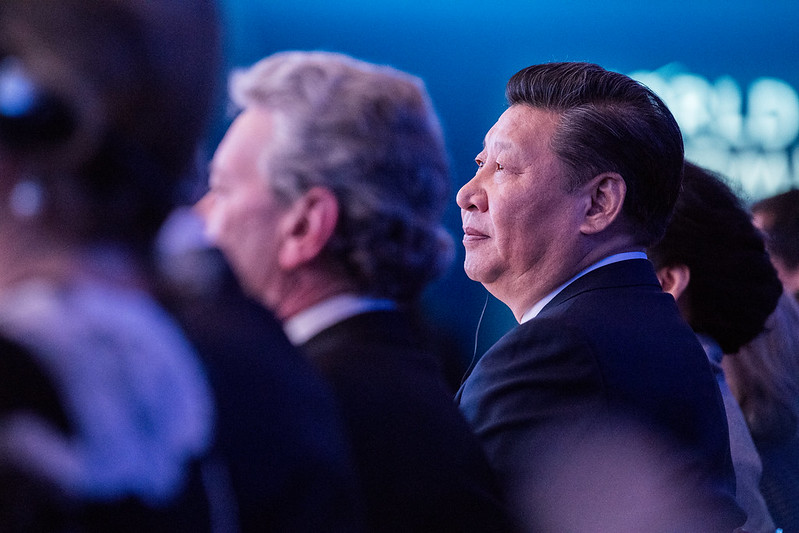Coronavirus Death Toll Rises Above 200; Experts Expect It to Spread
Lawfare's biweekly roundup of U.S.-China technology policy news.

Published by The Lawfare Institute
in Cooperation With

Coronavirus Death Toll Rises Above 200; Experts Expect It to Spread
The coronavirus, a virus that originated in the Chinese city of Wuhan, has killed more than 200 people and infected thousands more—mostly in China—over the past few weeks. Cases have been reported in South Korea, Japan, the United Kingdom and the United States, among other countries. The World Health Organization (WHO) declared a “public health emergency,” noting that the disease could prove especially deadly if it reaches countries with weak health care systems. The WHO declaration does not have the force of law, but rather constitutes guidance to governments. Ma Xiaowei, China’s health minister, said that the spread of the virus will accelerate. He added that the virus is infectious during an incubation period of up to two weeks, even though many people have no symptoms during that time.
After a muted response to early reports of the illness, the Chinese government has put Wuhan and surrounding cities on lockdown, suspending buses and subway lines, and imposing controls on flights and long-distance trains entering and exiting the city. But the mayor of Wuhan said that 5 million people left the city for the lunar new year before the official lockdown began. The government has also extended the official lunar new year holiday to reduce the risk of transmission from travel and work. Analysts have argued that China’s efforts to control the disease reveal both the strengths and weaknesses of its authoritarian system: While the government was able to mobilize quickly upon President Xi Jinping’s order to shut down transportation and provide medical support, officials initially downplayed the significance of the disease and censored media reports about the illness during the crucial initial stages of the outbreak.
Health experts believe the virus spread from wildlife to people at a Wuhan wet market, a large outdoor market where vendors sell a range of produce, meat and live animals—both domesticated and wildlife—to customers. Experts have noted that wet markets raise the risks of epidemics, but many shoppers in China prefer meat from wild animals. The SARS epidemic of 2002-2003 is also believed to have originated in a Chinese wet market. China briefly imposed restrictions on wet markets after the SARS epidemic, but enforcement has been lax.
President Trump said that U.S. authorities have the coronavirus “totally under control.” The United States has ordered its personnel at the American consulate in Wuhan to evacuate and is arranging a flight for Americans in Wuhan to return to the United States. The Centers for Disease Control and Prevention (CDC) has confirmed a few cases of the disease in the U.S., but it expects that the risk to the American public remains low. The CDC has introduced airport screenings for travelers arriving in the United States from affected areas and has been coordinating with departments of health in states where cases have been confirmed. Meanwhile, the State Department has issued a notice advising Americans to avoid traveling to China because of the virus.
While the virus has spread quickly, analysts argue that technological leaps made in the past few years have helped policymakers and medical professionals to respond effectively. Just two weeks after Chinese medical professionals reported to the World Health Organization that they had seen a number of patients suffering from a then-undiagnosed virus, scientists had isolated and published the coronavirus’s genetic sequence. (By comparison, about a year passed between early reports of the Zika virus in 2015 and its genetic sequencing.) Once scientists had the full genetic sequence of the coronavirus, they developed tests to diagnose it, a crucial step in curbing its spread.
In China, social media has also played an important role in raising awareness about the virus. In 2002, when the SARS virus appeared, just 6 percent of the Chinese population had internet access, while 61 percent do now. Through outlets like WeChat and Weibo, a social media platform with hundreds of millions of accounts, users shared information about the emerging virus even as the Chinese government sought to censor posts on the subject. Despite its initial campaign to stymie the flow of information on the topic, the Chinese government appears to have loosened media controls on the topic and has signaled publicly that the disease represents a “grave situation.” This stands in stark contrast to the government’s posture during the 2002- 2003 SARS epidemic, when China imposed a months-long media blackout on the subject and later admitted it had underreported early cases of the disease.
Analysts caution that it is too early to assess the extent of the damage the coronavirus may cause. At the moment, researchers are working on a vaccine for the disease. Experts say that it is difficult to predict when such a vaccine may be available but that human trials are at least a few months away.
Boris Johnson Approves Huawei Technology for Limited Use in U.K.’s 5G Network
On Jan. 28, in a widely expected move, U.K. Prime Minister Boris Johnson chose to let Huawei build part of the U.K.’s forthcoming 5G cellular network. Huawei will construct only“non-core” elements of the network—which include objects like antennae and base stations peripheral to the network’s main computing processes. According to Johnson’s decision, Huawei will also be subject to further supply restrictions. Johnson made his decision after discussions that day with Britain’s National Security Council, a cabinet-level committee, which approved of the prime minister’s plan. Prior to Johnson’s decision, the U.S. had pressured Johnson to exclude Huawei technology from its network entirely. However, U.K. officials want to incorporate Huawei technology because it is cheaper than that of rival firms, and because excluding Huawei would require removing its equipment from existing 4G networks.
As part of Johnson’s plan, the U.K. will label Huawei a “high-risk vendor,” which it had previously refrained from doing. This designation will limit Huawei’s share in the British market for 5G technologies to 35 percent and prevent it from supplying such products near military facilities. Johnson’s decision echoes former Prime Minister Theresa May’s agreement last April—which also angered U.S. officials—to let Huawei provide non-core 5G infrastructure.
American lawmakers and the Trump administration strongly oppose the U.K.’s use of Huawei 5G technology—and they were vocal about their opposition. President Trump spoke with Johnson by phone on Jan. 24 to discuss his administration’s security concerns. Writing a few days later that Britain faces a “momentous” decision, Secretary of State Mike Pompeo warned that including Huawei technology in its 5G networks would jeopardize British sovereignty. And last week, three Republican senators penned a letter to Britain’s National Security Council, issuing what they called “a genuine plea from one ally to another” to exclude Huawei from 5G.
Washington’s concerns center around the potential for China’s government to leverage Huawei technology for espionage and data theft, including data related to U.S. interests. In their letter to the U.K.’s National Security Council, the U.S. senators cautioned that approving Huawei could force the U.S. to “review U.S.-U.K. intelligence sharing” practices. British intelligence, however, believes that its monitoring procedures and the restrictions on Huawei can mitigate any risk that Beijing will co-opt Huawei technology for surveillance. U.K. authorities already subject Huawei software to special oversight by a government office, the Huawei Cyber Security Evaluation Centre Oversight Board. Not all British political figures agree with British intelligence’s assessment. Hours before the National Security Council meeting where Johnson made his final decision, many former senior government official surged him to change course.
Huawei officials have long maintained that the company operates independently from Beijing and that the Chinese government cannot compel its cooperation in espionage or data collection programs. Jerry Wang, the head of Huawei’s British division, made this argument last year as the U.S. advocated against the U.K.’s integration of Huawei technology. Wang decried Washington’s opposition to Huawei as a veiled attempt to insulate U.S. companies from competition. Huawei officials, however, have expressed satisfaction in the wake of the U.K.’s decision this week.
It remains unclear how these events will impact U.K. relations with the United States. Republicans this week widely condemned Johnson’s choice—with Nebraska Sen. Ben Sasse remarking that it makes the U.S.-U.K. relationship “less special.” Still, U.S. government sources have predicted that the two countries will continue collaborating effectively on security issues and that, despite the president’s apprehensions about the deal, the Trump administration will look favorably upon Johnson’s newly imposed restrictions on Huawei. And in a Jan. 28 phone call, Trump and Johnson reportedly discussed the need to work together on ensuring competition within the market for 5G. British Home Secretary Priti Patel has also expressed confidence that close intelligence cooperation among the U.S., U.K., Canada, Australia and New Zealand will “absolutely continue.”
Johnson’s actions may suggest that other American allies are also open to using Huawei technology, at a time when the company is looking to expand its global presence. Lately, Huawei has aggressively marketed its products to other U.S. allies in Europe. And the U.K. announcement comes shortly after Germany’s second-largest mobile phone company, Telefonica Deutschland, stated in December 2019 that Huawei will help it construct its 5G network.
Other News
Reporting emerged last week that the Department of Commerce on Dec. 31, 2019, withdrew a proposed expansion to the partial ban on selling U.S. technology components to Huawei after objections from the Department of Defense. Under the current policy, exports fall under the ban if U.S.-made components make up at least 25 percent of the product’s value. The rule change would have lowered this threshold to 10 percent. The Pentagon feared this change would reduce the revenues of U.S. firms that use proceeds from Chinese sales to fund research and development and thereby contribute to America’s technological edge. In particular, Pentagon leaders were concerned about the impact of the proposed expansion on the profits of firms such as Qualcomm, Intel and Micron, which produce semiconductors. U.S. chipmaker Qualcomm, for instance, generates most of its revenue from sales to China and saw its shipments plunge following last year’s rollout of the current ban. (Qualcomm has not yet obtained an exemption from the ban.) The Treasury Department reportedly also had concerns about the now-withdrawn proposal, and Trump plans to call a cabinet-level meeting in the coming days to discuss the rule.
The Payment & Clearing Association of China, an industry group within China, released on Jan. 20 a series of “self-discipline guidelines” aimed at safeguarding consumer-data privacy in payment systems that rely on facial-recognition technology. The guidelines, which have not yet been made public, reportedly call for three main protections to ensure that consumer data are stored safely: encrypting facial-recognition data, separating it from other consumer data such as bank account numbers and prohibiting its transfer to merchants. The guidelines also establish that consumers should retain rights to opt out of facial-recognition payment systems and receive compensation when the systems misidentify them. Chinese legal experts have stated that the guidelines would require financial institutions to sign formal agreements with merchants to uphold these principles. It remains to be seen how the guidelines will shape the implementation of facial-recognition payment systems in China. However, they come at a time when usage of such systems is skyrocketing both in China and worldwide. Currently, Alibaba and Tencent dominate China’s facial-recognition payment landscape. The latter firm, reporting this month makes clear, has begun rolling out a new payment platform in cooperation with China’s government.
The chair of Harvard’s chemistry department, Charles Lieber, has been charged by U.S. authorities for lying to the Department of Defense and the National Institute of Health about funding he received from the Chinese government. A federal criminal complaint alleges that Lieber misled the U.S. government about his participation in China’s Ten Thousand Talents Program, which seeks to recruit experts from around the world to help China outcompete rivals in technological and scientific research. U.S. officials believe that China has used the program to conduct intellectual property theft and espionage.
Earlier this month, local officials in Suzhou, a city in eastern China, published photos of seven residents wearing pajamas in public, as well as their names and other identifying information. The city’s urban management department, which released the photos, acquired them through public street cameras—which have proliferated rapidly in Chinain recent years. The release of the photos prompted widespread online condemnation of Suzhou’s local government from Chinese citizens. Officials soon apologized, attributing their actions to their participation in a national “civilized city” competition. However, they also affirmed their desire to continue condemning this “uncivilized” behavior, as well as others; going forward, they stated, they would continue sharing street images when appropriate but blur pictures of citizens. Suzhou officials’ actions emerge amidst growing concerns, in the U.S. and globally, about China’s use of surveillance and facial-recognition technology to suppress dissent and enforce conformity—particularly among Uighur populations. On Jan. 24, for instance, Defense Secretary Mark Esper expressed concerns over what he describes as the Chinese “surveillance state,” which “has unprecedented abilities to censor speech and infringe upon basic human rights.”
Commentary
In the Wall Street Journal, Paul Wolfowitz and Max Frost argue that Chinese government censorship and mismanagement contributed to the spread of the coronavirus. For the Washington Post, Ronald Klain and Nicole Lurie argue the Trump administration should reintroduce a position on the National Security Council for an expert in pandemics and develop a comprehensive, interagency strategy to handle the coronavirus. For MarketWatch, Shang-jin Wei argues that the coronavirus will likely have a relatively small economic impact.
For Brookings, Yun Sun argues that Chinese lenders should tighten credit availability for Belt and Road Initiative projects in Africa, to address staggering debt incurred by African countries from Chinese infrastructure projects on the continent. For Quartz, Yaqiu Wang argues that ByteDance, the parent company of TikTok, represents a security concern, because the company collects troves of data and has not demonstrated that it will stand up to Beijing on crucial issues.
In the New York Times, Ruchir Sharma argues that innovative firms and limited concern about data privacy have allowed China to stave off a more dramatic economic downturn. For the National Interest, Sebastien Roblin argues that India will likely not be able to check China’s plans for a stronger naval presence in the Indian Ocean. For the Los Angeles Times, Lindsay Gorman writes that the United States should not use its recent phase one trade deal as a reason to develop closer ties to China’s authoritarian regime. For the South China Morning Post, Austin Lowe argues that China’s new foreign investment law does little to clarify how the law will interact with China’s national security legislation. Lowe argues that this confusion creates doubts about whether certain kinds of investments will be permissible. For the Atlantic, Bethany Allen-Ebrahimian argues that U.S. universities must carefully weigh the costs and benefits of their associations with Chinese academic institutions that have close affiliations with the Chinese Communist Party.



.jpg?sfvrsn=82a6ee72_5)


